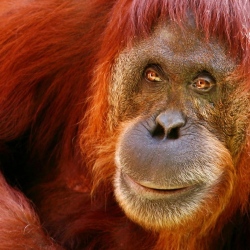
Human infants’ responses to the vocalizations of non-human primates shed light on the developmental origin of a crucial link between human language and core cognitive capacities, a new study reports.
Previous studies have shown that even in infants too young to speak, listening to human speech supports core cognitive processes, including the formation of object categories.
Alissa Ferry, lead author and currently a postdoctoral fellow in the Language, Cognition and Development Lab at the Scuola Internationale Superiore di Studi Avanzati in Trieste, Italy, together with Northwestern University colleagues, documented that this link is initially broad enough to include the vocalizations of non-human primates.
"We found that for 3- and 4-month-old infants, non-human primate vocalizations promoted object categorization, mirroring exactly the effects of human speech, but that by six months, non-human primate vocalizations no longer had this effect—the link to cognition had been tuned specifically to human language," Ferry said.
In humans, language is the primary conduit for conveying our thoughts.
The new findings document that for young infants, listening to the vocalizations of humans and non-human primates supports the fundamental cognitive process of categorization. From this broad beginning, the infant mind identifies which signals are part of their language and begins to systematically link these signals to meaning.
Furthermore, the researchers found that infants’ response to non-human primate vocalizations at three and four months was not just due to the sounds’ acoustic complexity, as infants who heard backward human speech segments failed to form object categories at any age.
